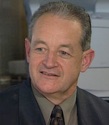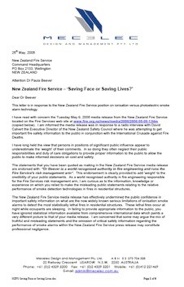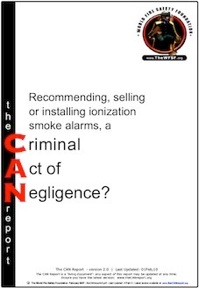


1. How many U.S. free ionization smoke detector give away programs are sponsored by some of the world’s largest smoke detector manufacturers who
are currently defendants in a proposed class action law suit for false representations in relation to their ionization smoke detectors?
2. Given the overwhelming scientific evidence proving that ionization smoke detectors are not fit-for-purpose, could Fire Departments be held
liable in the event of injury or death for failing to disclose the known, life-threatening limitations of ionization detectors to consumers?
Part 2: extracted from CBS - “Deadly Smoke Detectors” Expose
Fire Departments have a 'Duty of Care' not to cause foreseeable harm to people and their property, though they are exempted from this in the carrying out of certain of their duties, due to the nature of those duties. However, this is not a blanket exclusion and relates, in the main, to their fire fighting duties. The fire service still has the obligation to take all steps necessary to ensure that where possible they do not cause foreseeable harm to citizens or property.
Consider:
A fire department promotes a life safety device, such as a smoke alarm/detector, to the citizens in its area, yet does not disclose the known limitation of that device and these known limitations result in injury or death. Could the fire department have taken reasonable step to prevent this harm?
A fire department did not know the limitations of such a device when they first started promoting it, but they find out later, yet they then choose not to alert the citizens in their area to what they have found out and people who had earlier relied upon the fire departments recommendation are injured or killed. Could the fire department have taken reasonable steps to prevent this harm?
In fact, at law, it is not just whether they do know of the severe limitations of such a device, but whether they reasonably should know.
People and organisations in positions of power and influence have, arguably, a greater duty of care than those without that power and influence.
By promoting smoke alarms in the manner they have, fire departments have a duty of care to warn their citizens of any known limitations of those devices. When a fire department sells, distributes, or installs such devices then their duty of care is all the more.
- - - - - - - - - - Further Reading - - - - - - - - - -
‘Hagens Berman Sobol Shapiro -- Class Action Law Suit’
‘Recommending, Selling or Installing Ionization Smoke Alarms, A Criminal Act of Negligence?’
The S.A.F.E. Report
Hackert V BRK Brands Inc and First Alert Inc.
In February 2007, the CDC and other key government
organizations were sent, by registered (certified) mail,
The CAN Report warned about the known, life-
threatening limitations of ionization smoke detectors

In February 2010 after discovering that ionization detectors have a deadly flaw CBC reporter Jennifer Mayerle questioned a senior US Government representative about the relative merits of ionization v photoelectric smoke detectors. The Government representative stated:
CDC: “They both will give you equal time to react and get out of a fire.”
CBS: “But as we’ve shown you in our tough questions test, that’s not true.”




Part 1: extracted from The SAFE Report

Karl Westwell, CEO, Co-Founder
The World Fire Safety Foundation
Tauranga, New Zealand
August 2009


Jim Hacker, Hacker & Murphy LLP re Hackert v First Alert Inc & BRK Brands Inc.
Jim Hacker
Hacker & Murphy LLP, NY, USA


Part 3: extracted from
“I have long held the view that persons in positions of significant public influence appear to underestimate the ‘weight’ of their comments. In so doing they often neglect their public responsibilities and duty of care obligations to provide proper information to the public to allow the public to make informed decisions on cost
and safety.”

David Isaac
Standards Australia Fire
Protection Committee
Download: Here > > >



extracted from The SAFE Report > > >







Research shows we are hardwired to seek
consistency in life so we tend to only accept as
true facts that reinforce our current world view.



(c) Copyright 2010 The World Fire Safety Foundation | Last Updated: 13 August, 2011 | Privacy Policy | Disclaimer | Search WFSF site
For errors on, or suggestions for this ‘dutyofcare3’ webpage, contact the WFSF WebMaster | Supporters | About | Media